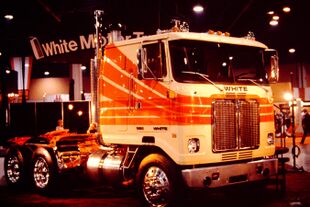Engineering:White Road Commander
| White Road Commander | |
|---|---|
 1979 model year White Road Commander 2 | |
| Overview | |
| Manufacturer | White Motor Corporation, later Volvo Trucks |
| Also called |
|
| Production |
|
| Body and chassis | |
| Class | Class 7-8 |
| Body style | Cabover truck |
| Layout | 4x2, 6X4[1] |
The White Road Commander was a series of heavy-duty cab-over trucks built by the White Motor Corporation and later Volvo Trucks from 1972 until 1983. Then the model was sold as the White High Cabover.
Design
In 1975 the modernized Road Commander 2 was introduced, with a split wraparound windshield and redesigned cabin using the "tapered" doors seen across the White lineup (many "2" version Autocars, and other classic White-owned Autocar and Western Star trucks sharing the White classic cab). Originally fitted with single round headlights, in the 1980s twin rectangular units also became available.
The Road Commander 2 has a bolted frame made of high tensile steel, while the all-aluminum cabin is hydraulically tilted.[2] This allows access to a wide range of available diesel engines from Cummins, Caterpillar, and other manufacturers. The available range in 1977 was from 190 to 450 hp (142 to 336 kW).[3] An unusual feature for the time was the RC2's pull-out drawer containing all electrical fuses and connections, located inside the cab.[1]
The later White High Cabover was available in WHS ("White High-cab Short"), WHL ("White High-cab Long"), WHE ("Extended") and WHM ("Medium") versions.
After the White nameplate was combined with that of GMC in 1988 the design continued to be built as a White GMC.
Foreign sales
The RC2 was also sold in many export markets, as such models met all period EEC and ECE regulations.[4] It was sold in several European markets such as Switzerland and the United Kingdom.


Western Star
Western Star had originally been created by White in 1967, specifically to target the west coast trucking markets[5] dominated by west coast makers Peterbilt and Kenworth. After White was purchased by Volvo in 1980, Western Star went its separate way — but the White-built cabovers continued to be available in Canada and in some western states with Western Star badging. The Western Star model never received the diagonal crossbar logo that other Volvo-built White trucks had. The Western Star Cabover also has a riveted on shield beneath the front windshield, helping to alter its appearance.
External links
References
- ↑ 1.0 1.1 Baldwin, Nick (1981), The Observer's Book of Commercial Vehicles (#40), London: Frederick Warne, p. 192, ISBN 0-7232-1619-3
- ↑ Kennett, Pat, ed (December 1978). "Pulling Power". TRUCK (London: FF Publishing Ltd): 53.
- ↑ White Road Commander 2, White Trucks, 1977, p. 5, AD 1991 30M 677 BL, http://www.whiteroadcommander.de/broschueren/broschuere2/?path=broschueren/broschuere2, retrieved 2014-05-14
- ↑ Pulling Power, p. 55
- ↑ Baldwin, p. 191
 |
